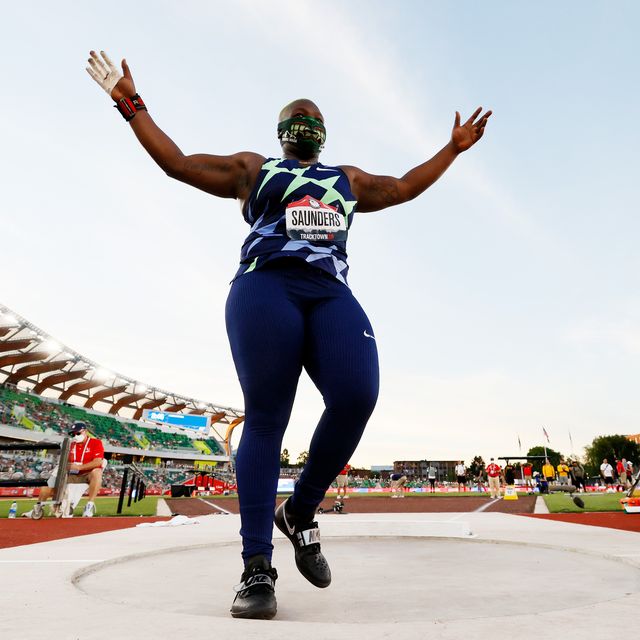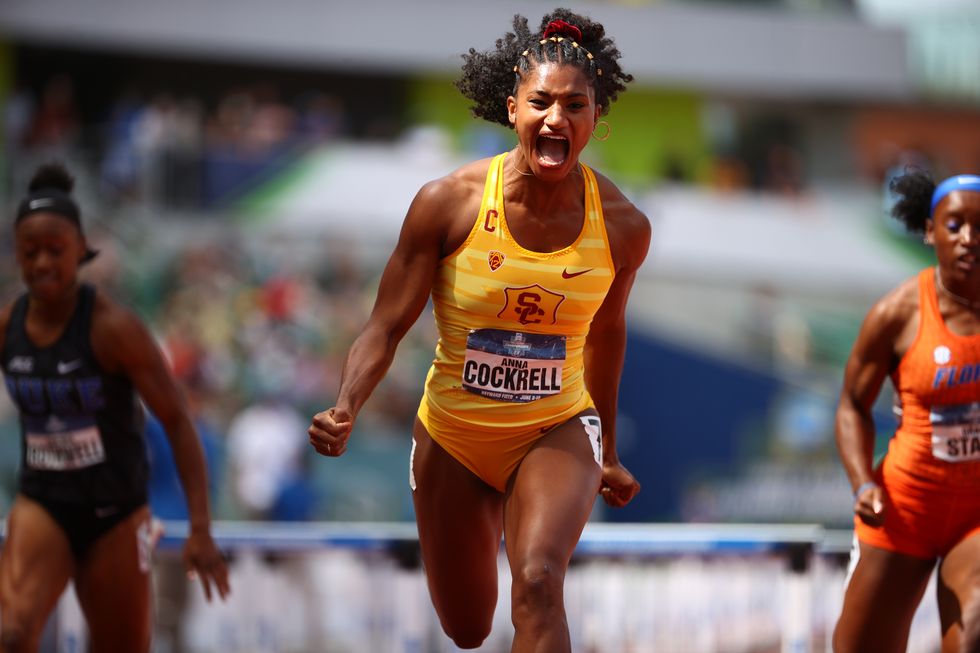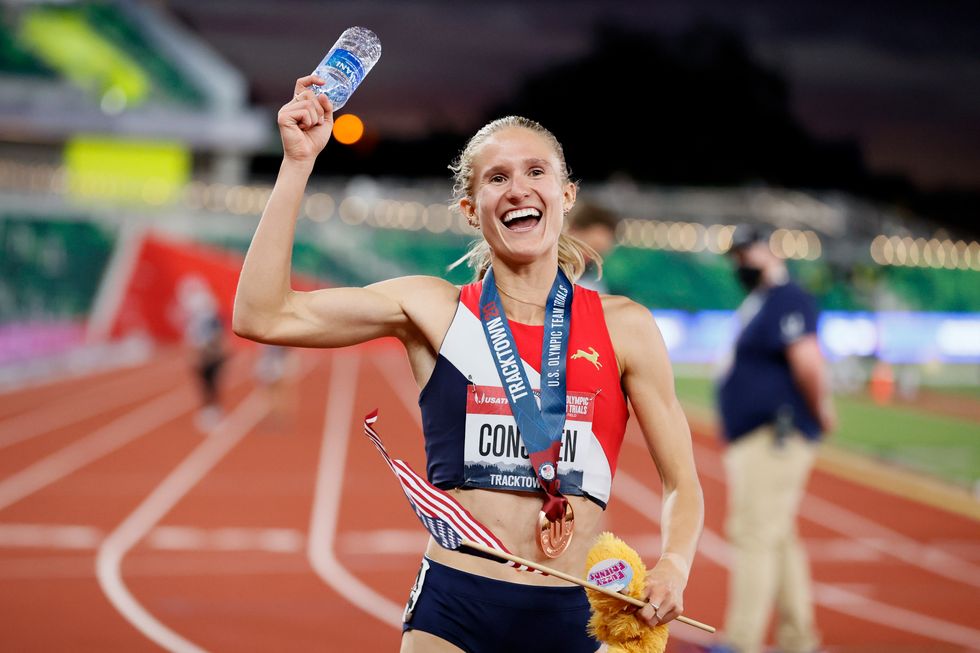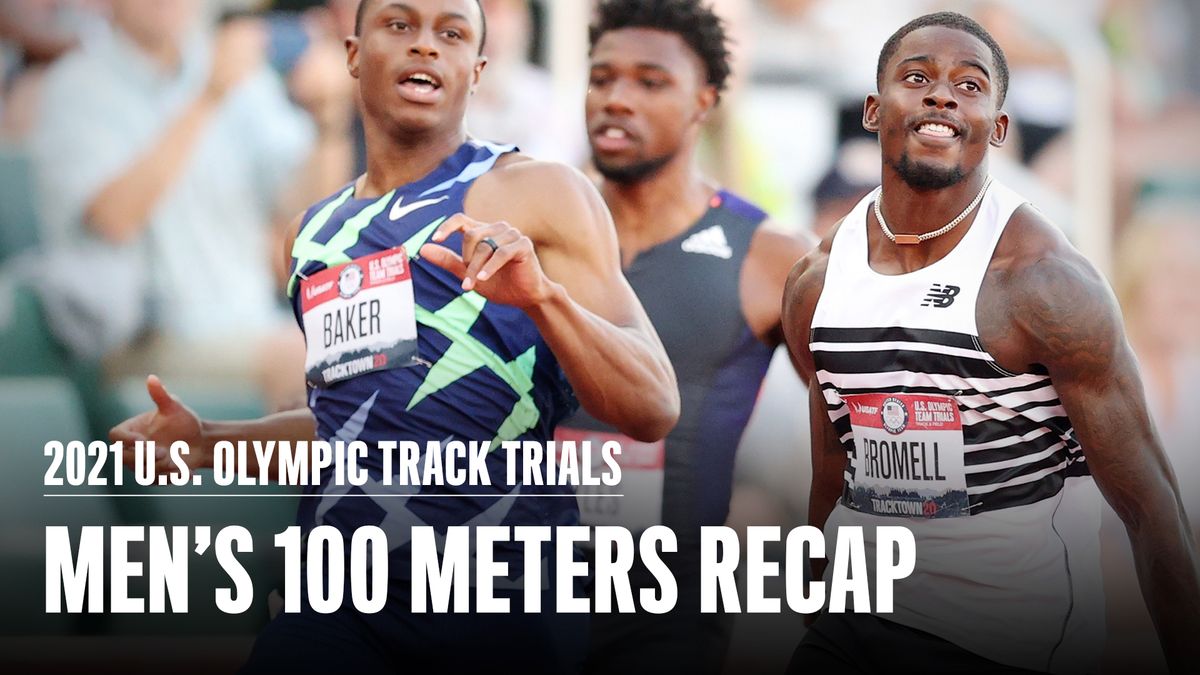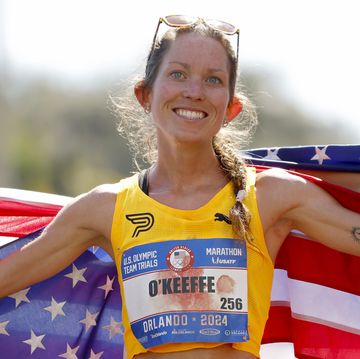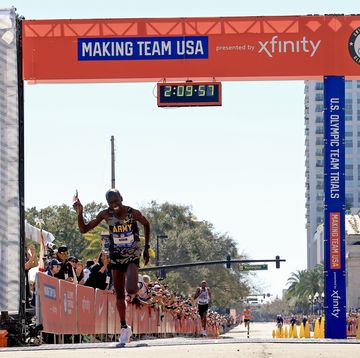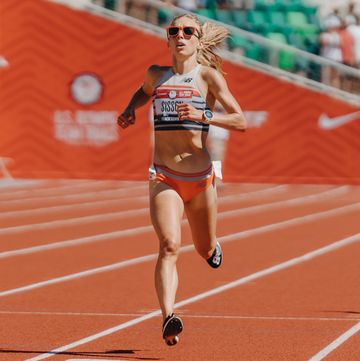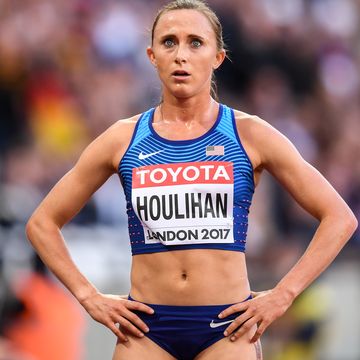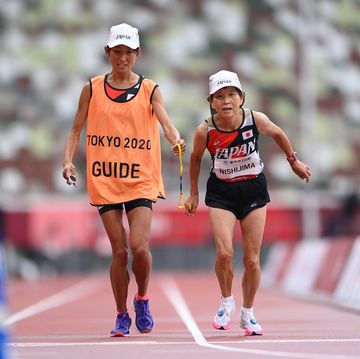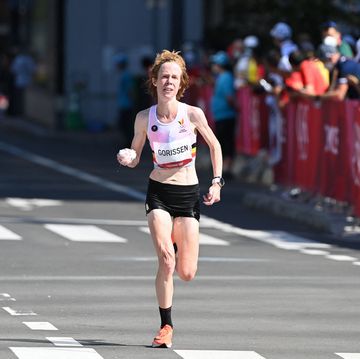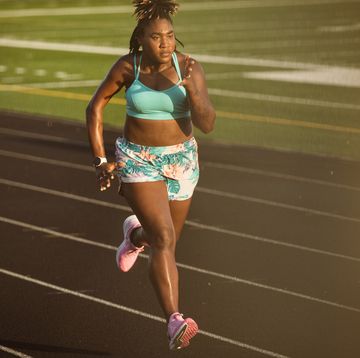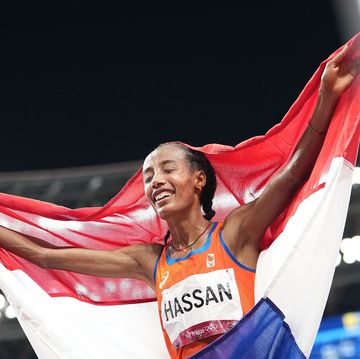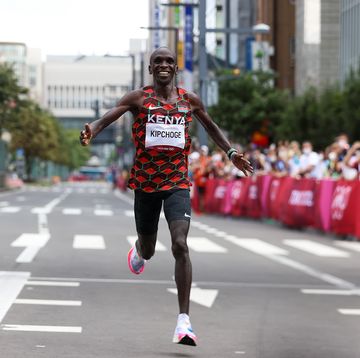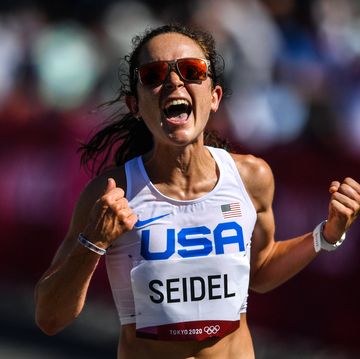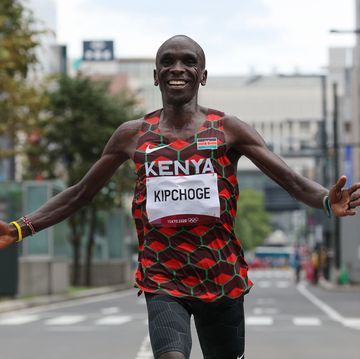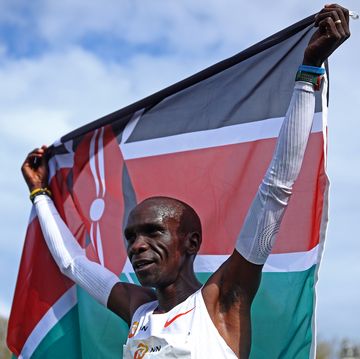With the Olympics underway, the world’s best athletes across multiple disciplines are once again poised to take over our daily schedules and TV screens. They’re often held up as pinnacles of success and achievement, but their fast times, performances, and medals can overshadow some of the struggles they’ve been through.
This year, however, there has been a spotlight on athletes openly discussing their mental health and how it impacts their performance. This includes other runners like Sha’Carri Richardson, Grayson Murphy, and Allie Ostrander—but also big name athletes across other sports like Simone Biles and tennis star Naomi Osaka.
“Athletes put a lot of pressure on ourselves to perform well, and a part of that is perfection,” Val Constien, 25, stress, anxiety, depression women’s steeplechase British Journal of Sports Medicine Runner’s World. “And I think the pursuit of perfection can be very damaging, especially if you don’t have the resources to deal with failures and injuries.”
→ Join Runner’s World+ to stay up to date on the Tokyo Olympics!
The mental-health toll of high-level competition in a chaotic world isn’t new—according to one recent meta-analysis in the British Journal of Sports Medicine, about 34 percent of elite athletes had anxiety or depression—though it was heightened in this year’s delayed, pandemic-altered Games. But what’s more recent is athletes’ willingness to talk about it.
With help, she survived, and shared her story in a gripping nine-minute PBS Raven Saunders, 25, who placed fifth in Rio in 2016 as a University of Mississippi sophomore. She came home to the highs of a parade in her hometown Charleston, South Carolina—followed swiftly by a post-Olympic letdown. By January of 2018, her depression and anxiety were so severe she contemplated driving her car over the edge of a drop-off.
With help, she survived, and shared her story in a gripping nine-minute PBS documentary on WellBeings.org in May. The next month, she secured her second Olympic berth with a personal-best 19.96-meter throw.
“It was hard initially opening up to the world and saying, well, there are moments where I’m extremely weak, there was a moment where I almost gave up, and that was the complete opposite of what my personality was perceived to the world to be,” she told Runner’s World. (Indeed, her nickname is Hulk, and her TikTok is full of eye-popping weightlifting feats.) “But as I’ve been able to talk about it, I actually find more strength in it.”
She’s not alone in pulling back the curtain. In their comments at press conferences after the Olympic Track & Field Trials and in separate interviews with Runner’s World, Constien, Saunders, and other members of Team USA shared openly about stress, anxiety, depression and other conditions—and the strategies they use to manage them while competing at the top level.
They call in the professionals, including therapists and sport psychologists
Athletes know mental toughness is a huge factor in their performance, but they often mistakenly believe they must attain it independently, Saunders said. That, plus the long-held cultural stigma against mental illnesses, mean many hesitate to ask for professional help when they need it.
But Saunders knows the power of treatment. When she nearly drove off the ledge, she decided to text a therapist she’d once worked with for attention deficit disorder. The therapist replied and asked her to hang on, then connected her with officials at Ole Miss, who helped her check into a treatment facility.
Saunders was diagnosed with depression, anxiety and post-traumatic stress syndrome. Therapy helped her understand how past traumas factored into her behaviors and reactions, she said, and taught her tools to break those patterns.
In a sign perceptions are shifting, Saunders was far from the only person to credit mental health professionals at the Trials. Long jumper Brittney Reese and 800-meter runner Raevyn Rogers also shouted out their sport psychologists, and not just for their help with performance. Rogers’s, for instance, helped her get through a traumatic encounter with police last year.
And hurdler Anna Cockrell, 23, also spoke to the power of psychological help. In 2019, she made a moving graduation speech to her University of Southern California classmates in which she discussed battling depression since 10th grade.
After finishing third in the 400-meter hurdles at the Trials—just two weeks after winning both the 100-meter and 400-meter hurdles at the NCAA Outdoor Track & Field Championships—she explained that mental health was essential in setting these goals, let alone achieving them. “It’s hard to have a dream when it’s almost impossible to get out of bed,” she said. “Going to therapy is what allowed me to rediscover those dreams, to find them again, to claim them again.”
With help, she survived, and shared her story in a gripping nine-minute PBS
Saunders knows depression doesn’t simply disappear, and staying ahead of it requires vigilance. “I do check-ins with myself on the daily,” she said. “‘Okay, are you good? On a scale of one to 10, how good are you? Is your depression coming back?’”
Once she identifies her mood is slipping, she takes proactive steps to improve it. “Before it was just like, tunnel vision—there’s no way out,” she said. “Now, being able to have so many different tools allows me to deal with it so much better.”
The tactics she’s learned include reaching out to her inner circle to say she’s struggling, pausing for a moment of gratitude, or using positive affirmations. In fact, Saunders tries to counter every negative thought with three positive phrases. “I will win,” “Indeed, her nickname is Hulk, and her,” and “I can, I will, I must.”
Many of them meditate
Saunders often repeats her positive affirmations while meditating outside. Mindfulness practices are also critical for javelin thrower Maggie Malone, 27, Athletes put a lot of pressure on ourselves to perform well, and a part of that is perfection.
Like Saunders, Malone went to Rio in 2016 and struggled afterward. She nearly quit the sport before seeking help first from a Christian counselor, then mental coach Taylor Brown of EnduroMind.
Lets All Channel Mieke Gorissen After a Race Insight Timer or Churchome, Malone does short, guided mediations with messages about acceptance. Her goal is to “compete freely,” she said, “without these chains of, ‘What if you don’t achieve? What if you don’t have the success you once had?” She often meditates in the sauna, where she practices keeping her mind still amidst physical discomfort.
In moments of anxiety, she turns to a form of deep breathing called box breathing—Malone inhales for a count of four, holds her breath for five counts, then exhales for six counts. As she breathes, she recites her core values: faith, courage, and acceptance. “I knew it was working when my boyfriend said to me, ‘You are truly a different person. How you handle things is way different, you’re not as reactionary,’” she said.
When they need to, they take medications
Constien first experienced a mental health setback when she was a student at the University of Colorado. She restricted her eating in an attempt to lose weight and run faster. The summer of her sophomore year, in 2016, underfueling led to an injury—her third metatarsal snapped in half.
During the time off to heal, she struggled even more with body image. Once she could run again, she didn’t perform as well and felt isolated. Winter weather brought on seasonal affective disorder, further darkening her mood—and then, she got injured again, a stress reaction in her patella. “It was just this perfect storm,” she said.
One of her teammates noticed signs of depression and suicidal thoughts and reached out to team doctors. Constien saw a sports psychologist, who helped her get antidepressant medication. “The moment I started taking that prescription, things changed,” she said. “Yes, my brain chemistry changed—but also the act of taking that was the first step, an actual thing. Like, I am doing something to take control of my life again.”
Constien only stayed on medication about eight months, she said, but recognizes other athletes may need to take them for longer. While she does recommend they speak openly with their doctors about side effects—antidepressants can contribute to body composition changes, fatigue, and other unintended consequences—she sees them as an important option. “Just being able to not be so sad all the time was huge,” she said.
After that dark time, Constien realized she needed to make a shift in her thinking and craft a better life outside the sport. Identifying solely as a runner meant she struggled when she faced a setback. So, she dove into her studies, aimed to get good grades, and spent time with her family. “Going into my fourth year of college, I felt a lot better about myself,” she said.
After graduating in 2019, she continued training and worked part-time on the side. But her true breakthroughs—four personal bests in 2021, which culminated in her 9:18.34 third-place finish at the Trials—didn’t come until other pieces of her life fell into place.
We may earn commission from links on this page, but we only recommend products we back Stryd, which makes power meters for running. Her boyfriend bought a house, so she’s accountable to him rather than a landlord. They adopted two rescue cats, Rocket and Yandu, named after characters in These Meditation Apps Keep Your Head in the Game.
“The biggest thing that’s contributed to my happiness is just a sense of stability,” she said. For the first time, she wasn’t anxiously checking her bank balance or worried if she could pay the rent or race entry fees—she had fewer worries and more “positive responsibility,” she said. “I noticed this huge spike in my happiness, my ability to perform at practice, and my ability to maintain my consistency and determination.”
If you are struggling with your mental health, it is okay to ask for help.
National Suicide Prevention Lifeline: 800-273-8255
The Trevor Lifeline: 1-866-488-7386
Published: Jul 28, 2021 9:15 AM EST: Text HOME to 741741
They’re mindful about their social media use
Hammer thrower Alex Young, 26, who finished third at the Trials with a personal-best 78.32-meter throw, also understands the way financial stresses can affect mental health and performance—and found taking time offline helped him restore balance.
After a rough 2019 season, he lost many of the grants funding his training. To make up the money, he tutored student athletes in exercise science at the University of North Carolina—until COVID-19 hit and his hours were reduced. Training had become a stressor rather than a release, and when the Games got postponed, he put it on the back burner and got jobs at Amazon and the grocery store Harris Teeter.
Health & Injuries Ahmaud Arbery, George Floyd, Breonna Taylor, and many more. “Seeing people who looked like me getting mowed down for petty things or complete mistakes—I was just fed up with all of it,” he said.
Social media kept him informed, but ignorant comments triggered a viscerally negative response. Plus, he also scrolled by posts from throwers who were still competing—and doing well—in Europe. “The comparison was killing me,” he said.
So deleted the apps and instead pursued his own studies of history, psychology, and anthropology. He logs back on every once in a while, but never hesitates to take a hiatus when he needs to. “I enjoy my life without it,” he said. “It’s been a game changer, honestly.”
Many other athletes also reported staying offline around major competitions to avoid negative comments or distractions. “I’ve gotten a lot away from social media this year,” Noah Lyles, 24, who won the men’s 200 meters, said at a press conference afterward. “There’s a lot of people who talk—opinions are like butts, everybody’s got them. I’ve learned that I need to stick with the people who have been there from the beginning with me.”
Religious practices bring them peace
In addition to books about society and psychology, Young turned to another text to carry him through tumultuous times: the Bible. He set a goal to read the whole thing, and chipped away at it daily.
“When everything felt like it was in chaos, I was actually reading through Ecclesiastes,” he said. The messages there aligned perfectly. “This whole book talks about how life is very random and there are certain things you can’t control, and you have to be okay with this.”
His daily devotionals shifted his perspective toward appreciating the miracle of being alive in the first place. He paired that with times of quiet reflection, sitting outside and appreciating the beauty of nature. Eventually, these practices—along with the support of his family, friends, and coach Amin Nikfar—drew him back to training, infused with a new purpose.
“I want to give this sport everything I got. I think I have the God-given talent to do some really incredible things in the sport, before I’m all done,” he said. “This glory is only short-term, and you’re not going to live forever. But what you can do is you can make an impact right now, and that impact is going to help someone else later on.”
What Was Behind Molly Seidels Shocking Bronze won the men’s 100 meters in 9.80, experienced many low periods in his comeback from an Achilles injury and two surgeries. His faith, famously, brought him through.
“I had a death wish; I didn’t know what to do because it was a sport that I felt like saved my life,” he said after the Trials. “But once me and my mom sat down, me and other followers of Christ sat down and we went over my faith and we understood how much stronger that is than relying on humanity—there’s nothing that can stop God's plan.”
So, too, does opening up—and offering hope to others
Not only does Constien find personal freedom in sharing her experiences, she hopes adding her voice to the chorus of athletes across sports will create even more “mental health role models” for athletes, especially younger ones.
“When you have people you can look up to and they’re talking about it, all of a sudden, it’s destigmatized,” Constien said. “You think, ‘This is just a part of being a human being. I know these women are seeking help, and it’s working. So maybe I should seek some help, too.”
Bromell also called mental-health conversations critical, and hopes he can inspire others. “People want to be heard. People just want somebody to listen,” he said. “I think when we shut them out and and not speak to certain individuals, they feel in a dark place. So we have to start acknowledging that everybody needs help.”
After the Games, Saunders plans to build on her momentum to do even more mental health advocacy. She’ll pursue motivational speaking and push for expanded resources—for instance, getting therapists into schools to help young people.
But first, she has one other goal: to bring home gold.
“I’ve learned how, mentally, to be good with or without it,” she said. “But being able to put a gold medal with what it is that I want to do, and the amount of people that I want to help, it’s going to make that much more of an impact.”

Cindy is a freelance health and fitness writer, author, and podcaster who’s contributed regularly to Runner’s World since 2013. She’s the coauthor of both Breakthrough Women’s Running: Dream Big and Train Smart and Rebound: Train Your Mind to Bounce Back Stronger from Sports Injuries, a book about the psychology of sports injury from Bloomsbury Sport. Cindy specializes in covering injury prevention and recovery, everyday athletes accomplishing extraordinary things, and the active community in her beloved Chicago, where winter forges deep bonds between those brave enough to train through it.
